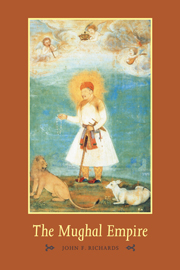Book contents
- Frontmatter
- Contents
- List of maps and tables
- General editor's preface
- Preface
- Introduction
- 1 Conquest and stability
- 2 The new empire
- 3 Autocratic centralism
- 4 Land revenue and rural society
- 5 Jahangir 1605–1627
- 6 Shah Jahan 1628–1658
- 7 The War of Succession
- 8 Imperial expansion under Aurangzeb 1658–1689
- 9 The economy, societal change, and international trade
- 10 Maratha insurgency and Mughal conquest in the Deccan
- 11 The Deccan Wars
- 12 Imperial decline and collapse, 1707–1720
- Conclusion
- Glossary
- Bibliographic essay
- Index
- THE NEW CAMBRIDGE HISTORY OF INDIA
2 - The new empire
Published online by Cambridge University Press: 28 March 2012
- Frontmatter
- Contents
- List of maps and tables
- General editor's preface
- Preface
- Introduction
- 1 Conquest and stability
- 2 The new empire
- 3 Autocratic centralism
- 4 Land revenue and rural society
- 5 Jahangir 1605–1627
- 6 Shah Jahan 1628–1658
- 7 The War of Succession
- 8 Imperial expansion under Aurangzeb 1658–1689
- 9 The economy, societal change, and international trade
- 10 Maratha insurgency and Mughal conquest in the Deccan
- 11 The Deccan Wars
- 12 Imperial decline and collapse, 1707–1720
- Conclusion
- Glossary
- Bibliographic essay
- Index
- THE NEW CAMBRIDGE HISTORY OF INDIA
Summary
In 1571 Akbar moved twenty-six miles from Agra to Fatehpur Sikri, a newly built city that would be his capital until 1585. During his fifteen year residence at Fatehpur Sikri Akbar directed major conquests and surmounted his most dangerous political crisis. The new city was also the site of significant organizational and administrative initiatives – measures that put an indelible stamp upon the Mughal imperial system. Brilliant innovations in land revenue, coinage, military organization, and provincial administration emerged from the Fatehpur Sikri years.
Why Fatehpur Sikri in preference to the great Indo-Muslim political capitals like Delhi, Agra, Lahore, and Jaunpur? Why remove to the village of Sikri at a hard day's march from Agra? Agra and Fatehpur Sikri were in reality joint capitals. For security the bulk of the imperial treasure hoards as well as arsenals and other reserves were kept in Agra fort. The court, harem, and treasury could be quickly removed to Agra for safety.
The newly constructed city bore a similarity to the movable imperial encampment also designed by Akbar. Fatehpur Sikri was an urban form in transition between camp and imperial metropolis. Akbar recreated his camp in stone within the boundaries of Fatehpur Sikri. The facades of the buildings strongly resembled the great wood and canvas structures erected in the imperial encampment. Like the camp, the capital gave the Mughal emperor a disciplined, controlled organism from which to write, rehearse, and play out the drama of imperial rule.
- Type
- Chapter
- Information
- The Mughal Empire , pp. 29 - 57Publisher: Cambridge University PressPrint publication year: 1993

